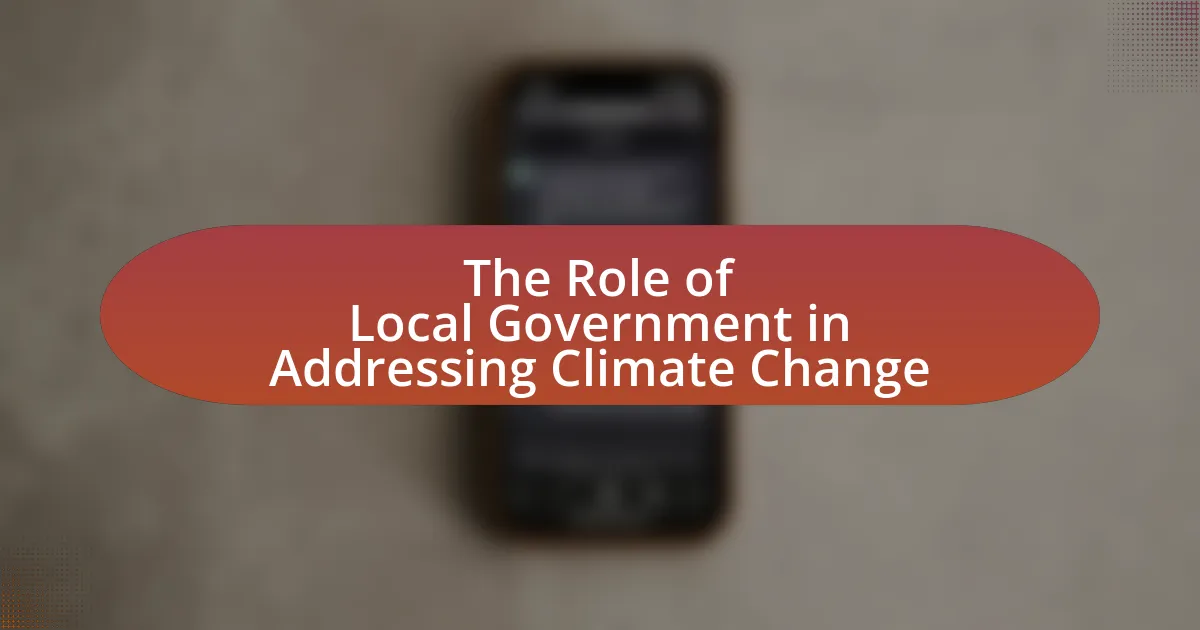The article examines the significant influence of local media on political awareness, highlighting its role in providing accessible information about local governance, political events, and community issues. It discusses how local media shapes political perceptions, informs the public about political issues, and enhances civic engagement, ultimately leading to increased voter turnout. The article also addresses the challenges faced by local media, such as budget constraints and misinformation, while proposing strategies for improving political coverage and engaging younger audiences. Additionally, it emphasizes the importance of community feedback and involvement in shaping local media content to foster a more informed electorate.

What is the Influence of Local Media on Political Awareness?
Local media significantly influences political awareness by providing accessible information about local governance, political events, and community issues. This influence is evident in studies showing that local news outlets are often the primary source of political information for residents, leading to increased civic engagement and informed voting behavior. For instance, research conducted by the Pew Research Center indicates that individuals who consume local news are more likely to participate in local elections and community discussions, highlighting the role of local media in shaping political consciousness.
How does local media shape political perceptions among citizens?
Local media shapes political perceptions among citizens by providing tailored news coverage that reflects community interests and issues. This localized focus allows citizens to engage with political topics that directly affect their lives, fostering a sense of relevance and urgency. Research indicates that local news outlets often prioritize stories about local governance, elections, and community events, which can significantly influence public opinion and voter behavior. For instance, a study by the Pew Research Center found that individuals who consume local news are more likely to be informed about local political candidates and issues, leading to increased civic participation. This demonstrates that local media plays a crucial role in shaping how citizens perceive and engage with the political landscape in their communities.
What role does local news coverage play in informing the public about political issues?
Local news coverage plays a crucial role in informing the public about political issues by providing relevant, localized information that directly affects community members. This coverage often includes reporting on local government actions, elections, and civic engagement opportunities, which helps residents understand how political decisions impact their daily lives. Studies have shown that communities with robust local news outlets tend to have higher voter turnout and increased civic participation, as local news serves as a primary source of information for residents seeking to engage with political processes. For instance, a report by the Pew Research Center indicates that local news significantly influences public awareness and understanding of local political issues, thereby fostering a more informed electorate.
How do local media outlets prioritize political stories?
Local media outlets prioritize political stories based on their relevance to the community, audience interest, and the potential impact on local governance. These outlets often assess which political issues resonate most with their audience, focusing on local elections, government decisions, and community concerns. For instance, a study by the Pew Research Center found that local news organizations frequently cover political stories that directly affect their readership, such as zoning laws or school board decisions, thereby enhancing political awareness among citizens. This prioritization is crucial as it shapes public discourse and informs voters about local political dynamics.
Why is local media important for political engagement?
Local media is important for political engagement because it provides accessible information about local issues, candidates, and events that directly affect the community. This localized focus fosters informed citizen participation, as studies show that individuals who consume local news are more likely to vote and engage in civic activities. For instance, a report by the Pew Research Center indicates that local news outlets significantly influence public awareness and political participation, with 62% of local news consumers stating they feel more connected to their community. Thus, local media serves as a crucial platform for enhancing political awareness and encouraging active involvement in the democratic process.
What impact does local media have on voter turnout?
Local media significantly enhances voter turnout by providing relevant information about elections, candidates, and voting procedures. Studies indicate that communities with robust local media coverage experience higher participation rates in elections. For instance, research published in the Journal of Communication found that local news outlets increase voter engagement by 20% through informative reporting and community-focused content. This connection between local media and voter turnout underscores the critical role that accessible and localized information plays in motivating citizens to participate in the electoral process.
How does local media influence public opinion on local elections?
Local media significantly influences public opinion on local elections by shaping narratives, providing information, and framing issues relevant to the community. Through coverage of candidates, policy debates, and local issues, local media outlets inform voters about their choices and the implications of those choices. For instance, studies have shown that local news coverage can increase voter engagement and turnout by highlighting the importance of local elections and the impact of policies on daily life. According to a 2018 study published in the Journal of Communication, communities with robust local media coverage saw a 10% increase in voter participation compared to those with limited coverage. This demonstrates that local media not only informs but also mobilizes the electorate, thereby playing a crucial role in shaping public opinion during local elections.

What are the mechanisms through which local media influences political awareness?
Local media influences political awareness primarily through information dissemination, agenda-setting, and community engagement. Information dissemination occurs as local media outlets report on political events, policies, and candidates, providing citizens with essential knowledge needed for informed decision-making. Agenda-setting is evident when local media prioritizes specific issues, shaping public perception of what is important in the political landscape. For instance, studies have shown that local news coverage can significantly impact voter turnout by highlighting local elections and issues, thereby increasing public interest and participation. Community engagement is fostered through local media platforms that encourage public discourse, allowing citizens to voice their opinions and engage with political content, which further enhances political awareness.
How do local media platforms disseminate political information?
Local media platforms disseminate political information primarily through news articles, broadcasts, and online content tailored to their specific communities. These platforms often focus on local government actions, elections, and political events, providing coverage that is relevant to their audience’s immediate interests. For instance, a study by the Pew Research Center found that local news outlets are crucial for informing citizens about local elections, with 70% of respondents indicating they rely on local media for political news. This localized approach not only enhances political awareness but also fosters community engagement by highlighting issues that directly affect residents.
What types of content are most effective in raising political awareness?
Informative articles, social media campaigns, and community forums are the most effective types of content in raising political awareness. Informative articles provide in-depth analysis and context about political issues, helping readers understand complex topics. Social media campaigns leverage platforms like Twitter and Facebook to reach a broad audience quickly, often using engaging visuals and concise messaging to capture attention. Community forums facilitate direct discussions among citizens, allowing for the exchange of ideas and fostering a sense of collective engagement. Research indicates that local media plays a crucial role in disseminating this content, as it often addresses issues directly relevant to the community, thereby enhancing political engagement and awareness.
How does the format of local media (print, broadcast, online) affect political engagement?
The format of local media—print, broadcast, and online—significantly affects political engagement by influencing how information is disseminated and consumed. Print media, such as newspapers, often provides in-depth analysis and context, which can foster informed discussions among readers. Broadcast media, including television and radio, tends to reach a broader audience quickly, often shaping public opinion through visual and auditory storytelling. Online media, characterized by its immediacy and interactivity, allows for real-time engagement and feedback, enabling users to participate in discussions and share information rapidly. Research indicates that individuals who consume news through multiple formats are more likely to engage in political activities, such as voting and attending town hall meetings, as they receive diverse perspectives and information. For instance, a study by the Pew Research Center found that 62% of Americans get news from multiple platforms, which correlates with higher levels of political participation.
What challenges do local media face in promoting political awareness?
Local media face significant challenges in promoting political awareness, primarily due to limited resources and competition from larger media outlets. These constraints often result in reduced coverage of local political issues, which diminishes public engagement. For instance, a study by the Pew Research Center found that local newsrooms have shrunk by 25% since 2004, leading to fewer journalists available to cover essential political topics. Additionally, local media often struggle with audience fragmentation, as consumers increasingly turn to digital platforms for news, which can dilute the impact of local political reporting. This combination of resource limitations and audience shifts hampers the ability of local media to effectively inform and engage the community on political matters.
How do budget constraints impact the quality of political reporting?
Budget constraints significantly reduce the quality of political reporting by limiting resources available for investigative journalism and comprehensive coverage. When media outlets face financial limitations, they often cut back on staff, leading to fewer reporters who can dedicate time to in-depth analysis and fact-checking. A study by the Pew Research Center found that local newsrooms have decreased by 25% since 2004, which correlates with a decline in the quality and quantity of political reporting. This reduction in resources can result in superficial coverage, reliance on press releases, and a lack of diverse perspectives, ultimately diminishing the public’s understanding of political issues.
What role does misinformation play in local media’s influence on politics?
Misinformation significantly undermines local media’s influence on politics by distorting public perception and shaping political narratives. Local media, often viewed as trusted sources of information, can inadvertently propagate false information, leading to misinformed voters and skewed political discourse. For instance, a study by the Pew Research Center found that 64% of Americans believe that misinformation has a major impact on their understanding of political issues. This distortion can result in the manipulation of public opinion, influencing election outcomes and policy decisions based on inaccurate representations of facts.

How can local media enhance political awareness in communities?
Local media can enhance political awareness in communities by providing accessible information about local governance, political events, and civic engagement opportunities. This information empowers residents to understand their rights and responsibilities, fostering informed participation in the democratic process. For instance, studies show that communities with active local news outlets experience higher voter turnout rates, as these outlets often cover local elections and issues extensively, making residents more aware of their electoral choices. Additionally, local media can facilitate discussions on political topics through forums and interviews with local leaders, further engaging the community in political discourse.
What strategies can local media adopt to improve political coverage?
Local media can improve political coverage by implementing strategies such as enhancing investigative journalism, fostering community engagement, and utilizing digital platforms for broader reach. Investigative journalism allows local media to uncover and report on political issues that directly affect their communities, thereby increasing accountability among local officials. For instance, a study by the Pew Research Center found that local news outlets that prioritize investigative reporting significantly contribute to public awareness and civic engagement. Additionally, fostering community engagement through town hall meetings and social media interactions enables local media to gather diverse perspectives and address the specific concerns of their audience. Utilizing digital platforms, such as websites and social media, expands the reach of political coverage, making it more accessible to a wider audience, as evidenced by the increase in online news consumption reported by the Reuters Institute for the Study of Journalism. These strategies collectively enhance the quality and relevance of political coverage in local media.
How can local media engage younger audiences in political discussions?
Local media can engage younger audiences in political discussions by utilizing digital platforms and interactive content. Research indicates that 85% of young people consume news through social media, making it essential for local media to establish a strong presence on platforms like Instagram, TikTok, and Twitter. By creating visually appealing and shareable content, such as infographics, short videos, and live Q&A sessions, local media can capture the attention of younger demographics. Additionally, incorporating user-generated content and encouraging audience participation through polls and discussions can foster a sense of community and investment in political issues. This approach aligns with findings from the Pew Research Center, which show that younger audiences prefer engaging formats that allow for interaction and feedback.
What partnerships can local media form to enhance political reporting?
Local media can enhance political reporting by forming partnerships with academic institutions, non-profit organizations, and technology companies. Collaborating with academic institutions allows local media to access research expertise and data analysis, improving the depth and accuracy of political coverage. For instance, partnerships with universities can facilitate fact-checking initiatives and provide resources for investigative journalism.
Engaging with non-profit organizations focused on civic engagement can help local media reach underserved communities and promote voter education, thereby increasing political awareness. These organizations often have established networks and resources that can amplify the media’s outreach efforts.
Additionally, partnering with technology companies can enhance the distribution and accessibility of political content through innovative platforms and tools. For example, collaborations with social media platforms can help local media target specific demographics, ensuring that political reporting reaches a broader audience.
These partnerships not only strengthen the quality of political reporting but also foster a more informed electorate, ultimately enhancing democratic participation.
What best practices should local media follow to foster political awareness?
Local media should prioritize accurate reporting, community engagement, and educational programming to foster political awareness. Accurate reporting ensures that citizens receive reliable information about political events, candidates, and policies, which is essential for informed decision-making. Community engagement, such as hosting town hall meetings and forums, allows local media to connect with residents, encouraging dialogue and participation in the political process. Educational programming, including workshops and informational segments on civic duties and voting rights, empowers citizens with the knowledge necessary to navigate the political landscape. These practices are supported by studies indicating that informed communities are more likely to participate in elections and civic activities, thereby enhancing overall political awareness.
How can local media ensure accuracy and credibility in political reporting?
Local media can ensure accuracy and credibility in political reporting by implementing rigorous fact-checking processes and maintaining transparency in their sourcing. Fact-checking involves verifying information against reliable sources before publication, which helps prevent the dissemination of false information. For instance, organizations like PolitiFact and FactCheck.org provide frameworks that local media can adopt to assess the truthfulness of political claims. Additionally, transparency in sourcing allows audiences to understand where information originates, fostering trust. A study by the Pew Research Center found that 62% of Americans believe that transparency in reporting enhances credibility, underscoring the importance of these practices in local media’s role in political awareness.
What role do community feedback and involvement play in shaping local media content?
Community feedback and involvement are crucial in shaping local media content by ensuring that the media reflects the interests and concerns of the community it serves. Local media outlets often rely on audience input to identify relevant topics, gauge public sentiment, and enhance engagement. For instance, studies have shown that when local news organizations actively solicit feedback through surveys or community forums, they can tailor their reporting to better address the specific needs and preferences of their audience, leading to increased viewership and trust. This participatory approach not only fosters a sense of ownership among community members but also enhances the media’s role as a platform for civic dialogue, ultimately contributing to a more informed and politically aware populace.
What practical steps can citizens take to engage with local media for political awareness?
Citizens can engage with local media for political awareness by actively participating in community discussions and providing feedback on news coverage. This can be achieved by attending town hall meetings, writing letters to the editor, and utilizing social media platforms to share opinions and ask questions about local issues. Research indicates that community engagement increases the visibility of political topics, as seen in studies showing that local news outlets often prioritize stories that reflect public interest and concern. By voicing their perspectives, citizens can influence the topics covered by local media, thereby enhancing political awareness within their communities.




